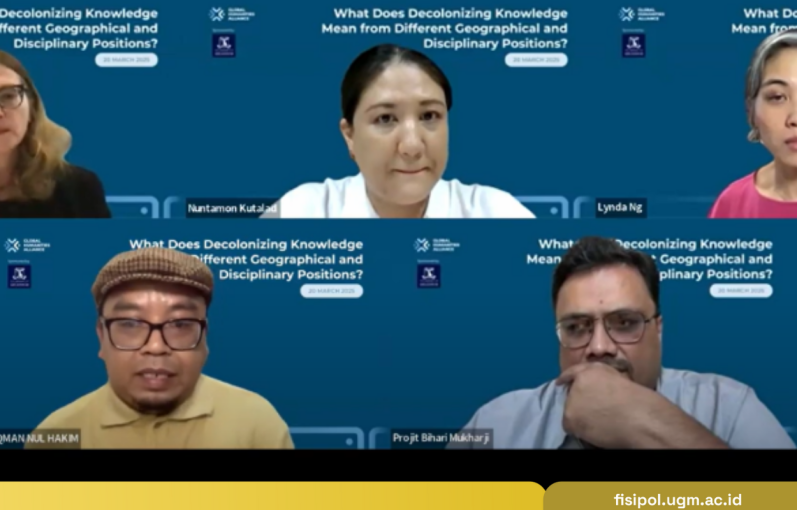
Melbourne, 20 March 2025–The Faculty of Social and Political Sciences, Universitas Gadjah Mada (FISIPOL UGM), participated in a discussion organized by the Global Humanities Alliance (GHA) entitled “What Does Decolonizing Knowledge Mean from Different Geographical and Disciplinary Perspectives?”. FISIPOL UGM is one part of GHA, which is a forum for cooperation between 8 universities in the world to contribute to global discourse in the field of social humanities that focuses on responding to international issues.
This discussion forum is intended to accommodate various perspectives on knowledge decolonization among GHA members. The session also invited several panellists who represented several universities: Dr. Lynda Ng (University of Melbourne, Australia), Dr. Luqman-nul Hakim (UGM, Indonesia), Dr. Nuntamon Kutalad (Mahidol University, Thailand), and Prof. Projit Mukharji (Ashoka University, India).
In the presentation session, Dr. Luqman-nul Hakim (Aim) dissected the development of knowledge decolonization in Indonesia. Aim also highlighted that decolonization in the Indonesian context occurs with different orientations and often overlaps or contradicts. “Decolonizing knowledge in Indonesia, often labelled outwardly as ‘Pribumisasi‘ or indigenization of knowledge, emerged productively during the 1970s and 1990s with different orientations,” said Aim.
Furthermore, in the presentation session, Aim divided three manifestations that indicated the decolonization process in Indonesia. First, decolonization emerged to respond to the dominance of modernization theory in the late 1970s, where there was an aspiration to encourage the social sciences and humanities in solving human problems. However, at the same time, under the New Order regime, social science was used as an instrument to legitimize policies and cover up facts about inequality and poverty.
Second, decolonization in Indonesia is marked by the debate between Islamic and secular knowledge, and in this context, the pattern follows the 1979 Iranian Revolution. Nonetheless, in the New Order authoritarianism regime that depoliticized the campus movement, making Islam one of the safest places, scholars later referred to this phenomenon as the “Islamization of societies”. Not only that, the Islamization of societies, instead of creating a new hegemony in knowledge, sparked polarization among Muslims, which in turn created knowledge isolation that failed to offer a collection of knowledge to be developed.
Third, the influence of the paradigm of “Orientalism”, Edward Said and Postmodernism, both of which encourage a return to criticize Western perspectives and return to local knowledge. The trend of regional knowledge production has been highlighted in anthropology and sociology studies, highlighting local perspectives that have been marginalized by modernization, but have not produced a direct political impact, resulting in minimal structural changes in knowledge.
